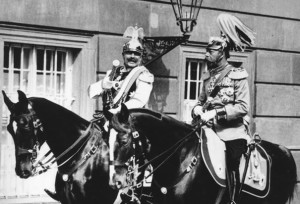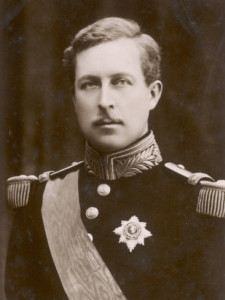
German Kaiser Wilhelm II, left, and British King George V were first cousins and grandsons of the late Queen Victoria as was Czar Nicolas II of Russia. None of the trio escaped unscathed from the war. Bolshevists killed Nicolas and his family in 1918, Wilhelm fled to Holland where his health deteriorated. King George V survived but aged under the weight of responsibility during the war. His dark beard and hair turned white almost over night after a visit to the Western Front.
August 4 marks the 100th anniversary of the invasion of Belgium by Germany, the start of what was then known as the Great War. Countless books have been written about the war and continue to be published. I set about earlier this year to investigate the causes of that war, and how it affected human beings around the world.
Guns of August: The Outbreak of World War I by Barbara W. Tuchman (1962) is the best resource I have found so far. The book contains vivid details, an easy prose style that makes the reader turn the page, and a cool detachment of moral judgment of the war. The author was in a unique situation when she wrote her Pulitzer Prize winning work; her grandfather was Henry Morgenthau, Sr. the U. S. Ambassador to Turkey during World War I. President John F. Kennedy gave a copy of the book to British Prime Minister Macmillan, observing that somehow contemporary statesmen must avoid the pitfalls that led to August 1914.
To me, Guns of August seemed to give clarity to the question of why did it all have to happen? That is the thesis of Tuchman’s work; it didn’t have to happen. In the summer of 1914, there were times when compromise could have occurred, when schedules could have been altered. But to quote Tuchman, the “deadlock of the terrible month of August 1914 determined the future course of the war and the terms of peace, the shape of the inter-war period and the conditions of the Second Round” (1939-1945).
Barbara Tuchman placed the responsibility of the Great War squarely on the shoulders of “foolish monarchs, diplomats, and generals who blundered into a war nobody wanted, an Armageddon which evolved with the same grim irreversibility as a Greek tragedy.” Three of the key players were grandchildren of the late Queen Victoria of England; Kaiser Wilhelm II of Germany, King George V of England, and Czar Nicolas II of Russia. Over the years and through secret alliances Germany and Austria-Hungary had allied against the Central Powers of France, Russia, and reluctantly Great Britain. All major players agreed to respect the neutrality of the small kingdom of Belgium, though.

King Albert of Belgium chose to resist the advance of the German army through his country in August 1914. While devastating damage was wreaked on the country, the resistance stopped German victory in four to six weeks as the Kaiser planned.
When Germany, in its belief that arms and war were the sole greatness of the nation, determined to attack France and win the war in four to six weeks, the easiest and shortest route to Paris was through Belgium. Unexpectedly, Belgians defended their country. The resistance devastated Belgium but slowed down the German army. What was expected to be a short war in late summer, turned in massive death and destruction that lasted for more than four years. By then, almost every nation in the world was involved.
In the final paragraph of the Afterword, Barbara Tuchman summed up World War I very succinctly when she wrote; “nations were caught in a trap . . . a trap from which there was . . . no exit.” An excellent film produced in 1996 can be viewed on You Tube. Google “Guns of August movie” to find it on-line. It is a good introduction to the war that cost so many lives and set the stage for further violence twenty years later.
